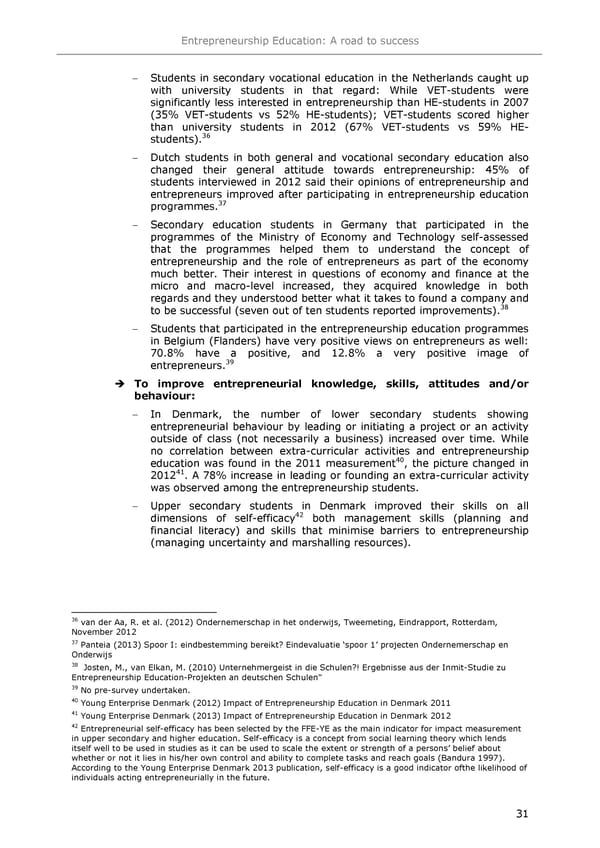Entrepreneurship Education: A road to success Students in secondary vocational education in the Netherlands caught up with university students in that regard: While VET-students were significantly less interested in entrepreneurship than HE-students in 2007 (35% VET-students vs 52% HE-students); VET-students scored higher than university students in 2012 (67% VET-students vs 59% HE- students).36 Dutch students in both general and vocational secondary education also changed their general attitude towards entrepreneurship: 45% of students interviewed in 2012 said their opinions of entrepreneurship and entrepreneurs improved after participating in entrepreneurship education 37 programmes. Secondary education students in Germany that participated in the programmes of the Ministry of Economy and Technology self-assessed that the programmes helped them to understand the concept of entrepreneurship and the role of entrepreneurs as part of the economy much better. Their interest in questions of economy and finance at the micro and macro-level increased, they acquired knowledge in both regards and they understood better what it takes to found a company and 38 to be successful (seven out of ten students reported improvements). Students that participated in the entrepreneurship education programmes in Belgium (Flanders) have very positive views on entrepreneurs as well: 70.8% have a positive, and 12.8% a very positive image of 39 entrepreneurs. To improve entrepreneurial knowledge, skills, attitudes and/or behaviour: In Denmark, the number of lower secondary students showing entrepreneurial behaviour by leading or initiating a project or an activity outside of class (not necessarily a business) increased over time. While no correlation between extra-curricular activities and entrepreneurship education was found in the 2011 measurement40, the picture changed in 41 2012 . A 78% increase in leading or founding an extra-curricular activity was observed among the entrepreneurship students. Upper secondary students in Denmark improved their skills on all dimensions of self-efficacy42 both management skills (planning and financial literacy) and skills that minimise barriers to entrepreneurship (managing uncertainty and marshalling resources). 36 van der Aa, R. et al. (2012) Ondernemerschap in het onderwijs, Tweemeting, Eindrapport, Rotterdam, November 2012 37 Panteia (2013) Spoor I: eindbestemming bereikt? Eindevaluatie 8spoor 19 projecten Ondernemerschap en Onderwijs 38 Josten, M., van Elkan, M. (2010) Unternehmergeist in die Schulen?! Ergebnisse aus der Inmit-Studie zu Entrepreneurship Education-Projekten an deutschen Schulen" 39 No pre-survey undertaken. 40 Young Enterprise Denmark (2012) Impact of Entrepreneurship Education in Denmark 2011 41 Young Enterprise Denmark (2013) Impact of Entrepreneurship Education in Denmark 2012 42 Entrepreneurial self-efficacy has been selected by the FFE-YE as the main indicator for impact measurement in upper secondary and higher education. Self-efficacy is a concept from social learning theory which lends itself well to be used in studies as it can be used to scale the extent or strength of a persons9 belief about whether or not it lies in his/her own control and ability to complete tasks and reach goals (Bandura 1997). According to the Young Enterprise Denmark 2013 publication, self-efficacy is a good indicator ofthe likelihood of individuals acting entrepreneurially in the future. 31
 Entrepreneurship Education Page 34 Page 36
Entrepreneurship Education Page 34 Page 36